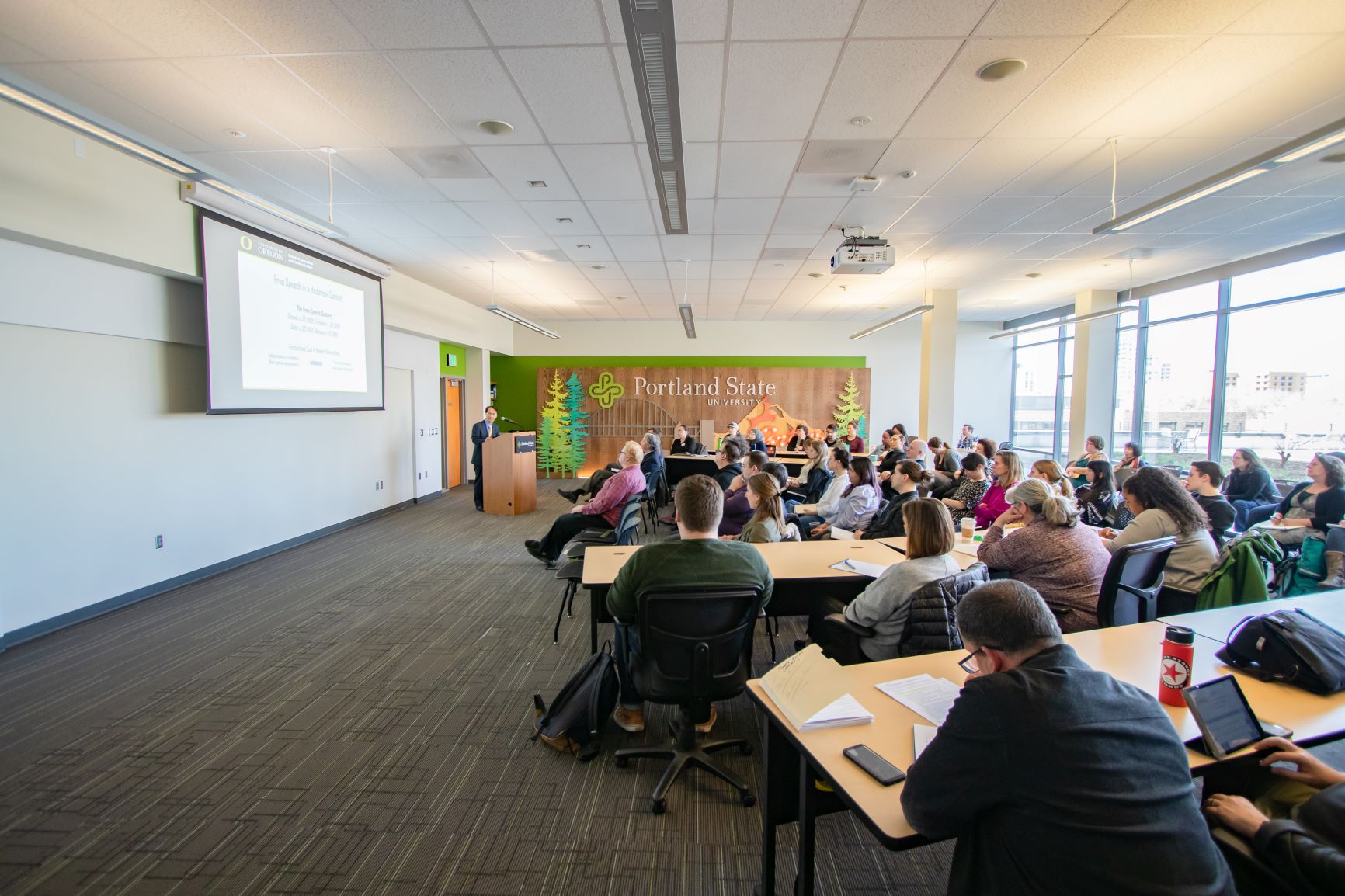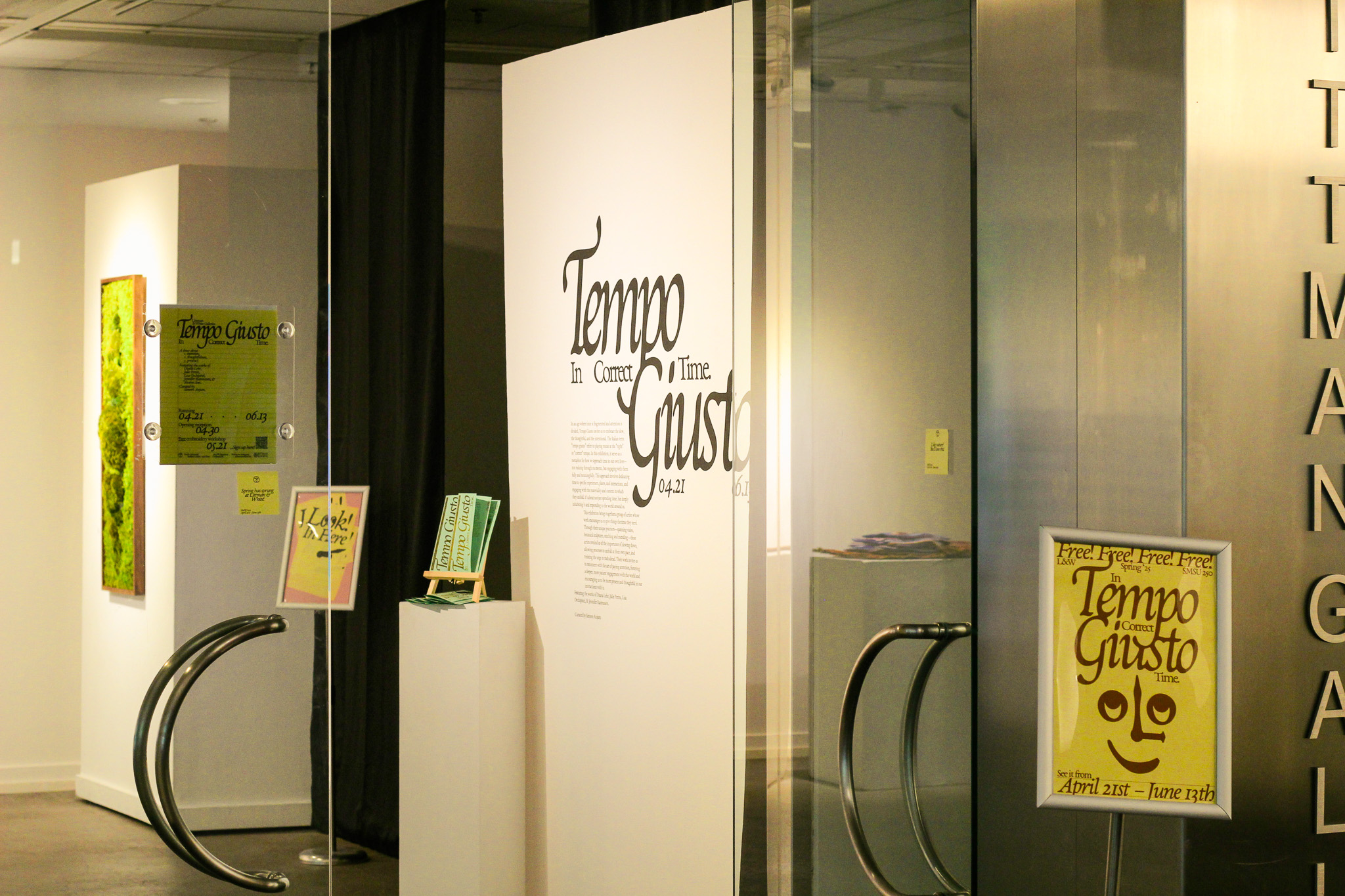The Foundation for Individual Rights in Education rated Portland State a “red light” institution for First Amendment violations five years in a row.
FIRE has pointed out discrepancies in PSU’s adherence to First Amendment policies and stated the university has “at least one policy that both clearly and substantially restricts freedom of speech.”
Amid complaints about infringement of free speech on PSU’s campus, University of Oregon Professor Kyu Ho Youm opened a campus-wide conversation on the bounds of free speech on college campuses.
On March 28 at the Academic and Student Recreation Center, Youm—an expert on free speech and law scholar on the First Amendment—detailed the context of the battle for free speech on college campuses in the last year.
“The marketplace of ideas…involves the freedom to speak or not to speak,” Youm said. “There is no such a thing as freedom of content of speech. Freedom for students and also for faculty members is essential.”
PSU Violations of Free Speech
A recent free speech issue cited by FIRE occured when a protester with a cowbell disrupted an event on March 5 hosted by the PSU College Republicans. Campus Public Safety officers did not remove or otherwise prevent the protester from disrupting the speech.
In a statement issued after the event, PSU said the CPSO officers “used professional judgment and determined not to threaten or restrain the individual so as not to escalate a potentially unsafe situation.”
Failing to remove the protester technically violated the speech policies laid out on PSU’s Free Speech Guide, a newly created website by PSU’s Protest and Expression Advisory Team presented after Youm’s speech.
The website states that students and faculty—as well as outside guests—have the right to peacefully protest a speaker or event so long as the event is able to continue without “significant or material disruption.” Protesters are not allowed to modify the content of what is being expressed for a group or audience.
The website continues to say preventing a speaker from presenting is not an acceptable form of protest.
In a later statement forwarded by Associate Vice President for University Communications Chris Broderick, PSU stated, “PSU facilities management allowed College Republicans to extend their meeting beyond the scheduled end time that night…it continued without incident.”
The statement continues, “If the individual who interrupted the event was a PSU student, PSU’s student code of conduct would have taken effect.” However, the website’s guidelines do not distinguish between “members of the university community” and “outside guests.”
Another free speech issue brought up by FIRE occurred when an International Socialist Organization meeting scheduled for Jan. 24 was canceled after Joey Gibson, a member of the far-right group Patriot Prayer, expressed his intent to show up. He received a negative response from individuals on social media, who threatened to show up and “fuck [him] up.”
The event was canceled shortly after Chief of Police Donnell Tanksley was made aware of the circumstances.
FIRE cites the cancelation of the ISO event as a free speech violation, as the free speech policies dictate a public university cannot preemptively cancel an event due to the content being discussed.
The Free Speech at PSU website supports the cancelation, saying “while the campus is constitutionally required and philosophically committed to protecting speakers and preventing disruption or violence, if the university determines that the event cannot be held in a safe manner (serious threats to person or property), the event can be canceled or postponed. Such action cannot be based on the views or content of the speaker.”
Trump’s Executive Order
Youm’s talk on free speech on college campuses served not only as context for universities’ struggles with the First Amendment but also with the recent executive order issued on March 21 from the Trump White House “to ensure institutions that receive federal research or education grants promote free inquiry, including through compliance with all applicable federal laws.”
Youm criticized the executive order during his speech, saying, “The question is, when President Trump is talking about free speech, free speech for whom? Free speech for liberals? Free speech for conservatives? Or free speech for all?”
On the issue of federal funding for universities complying to free speech policies, Youm said that “free speech code and censoring is not allowed under the First Amendment…it is unconstitutional. It is so inherently vague.”
He continued by defining federal funding as a privilege under the First Amendment. Youm brought up concerns about who allocates the grants, suggesting the allocating parties should be “professionally neutral,” and the allocation procedure requires caution and expertise.
PSU President Rahmat Shoureshi issued a statement on March 28 in light of the executive order regarding grant funding for the First Amendment, stating, “[At PSU] we have policies and procedures that are consistent with the executive order to protect free speech rights such as lawful protests and demonstrations while also protecting the rights of individuals against threats, discrimination and harassment.”
Shoureshi continued that PSU expects the federal agencies overseeing grant allocation to be nonpartisan and continue an independent review process.
Free Speech for All
Universities across the nation have dealt with similar controversies regarding the bounds of protest and free speech. In 2017, a group of UO students blocked the president from delivering the State of the University speech.
Virginia Polytechnic Institute and State University faced similar circumstances when students demanded the university fire an alleged white supremacist from their position as a teaching assistant. They protested by interrupting and derailing the president’s State of the University speech.
The two events at Virginia Tech and UO prompted the University of Wisconsin to pass a policy aimed at punishing students who disrupt campus speakers by threatening them with expulsion, according to Insider Higher Ed.
PSU’s Response
Aimee Shattuck, director of student activities and leadership programs, said PSU was prioritizing free speech by putting out a resource guide and “suggesting or clarifying policy and protocol for campus.”
Michele Toppe, associate vice president of student affairs, said she did not think there was a contradiction between the practices of PSU versus the policies outlined on the website. “I think how speech gets addressed is nuanced” she continued.
On student involvement in the decision-making process about free speech policies on campus, Shattuck said, “Event organizers are primarily students and that is who we will be working with on protocols. The free speech guide was sent to everyone in the PSU community, [and] the majority of the community members are students.”
Toppe also said on the Strickland speech interrupted by a protester that, in many cases, events are planned with the “express purpose of knowing [the event] is going to prompt conflict.”
“If you’re having an event [like the Strickland event hosted by the PSU College Republicans], you’re only there to invite the disruption, to say ‘they’re not letting me speak,’” Toppe continued.
“We’re not going to get sucked into the emotionality [of this conflict] but rather have it move to a plane where we’re having a dialogue that’s consistent with the values of an educational institution,” Toppe said.







‘Youm criticized the executive order during his speech, saying, “The question is, when President Trump is talking about free speech, free speech for whom? Free speech for liberals? Free speech for conservatives? Or free speech for all?”’
Without a doubt, Trump seeks to protect the rights of conservative students. But his only weapon is an executive order, and such an order can not differentiate. In seeking to protect the rights of some students, Trump must protect the rights of all.
All this fuss over one guy ringing a cow bell?